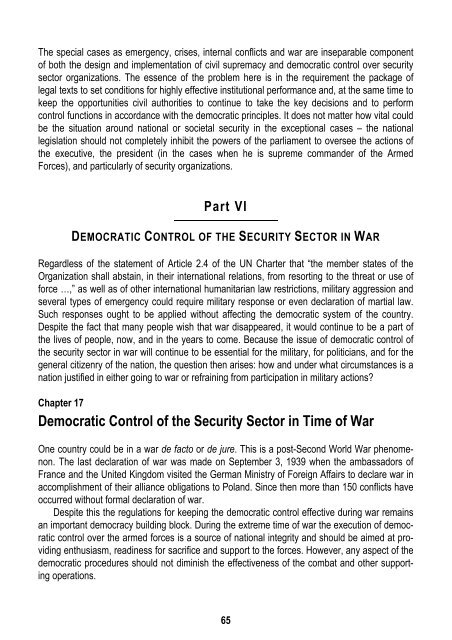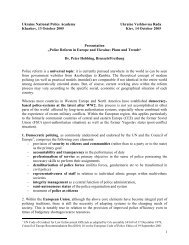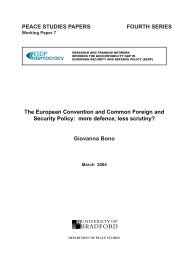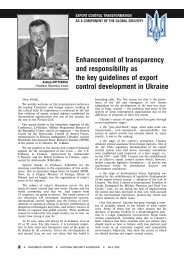Civil-Military Relations and Democratic Control of the Security Sector
Civil-Military Relations and Democratic Control of the Security Sector
Civil-Military Relations and Democratic Control of the Security Sector
Create successful ePaper yourself
Turn your PDF publications into a flip-book with our unique Google optimized e-Paper software.
The special cases as emergency, crises, internal conflicts <strong>and</strong> war are inseparable component<br />
<strong>of</strong> both <strong>the</strong> design <strong>and</strong> implementation <strong>of</strong> civil supremacy <strong>and</strong> democratic control over security<br />
sector organizations. The essence <strong>of</strong> <strong>the</strong> problem here is in <strong>the</strong> requirement <strong>the</strong> package <strong>of</strong><br />
legal texts to set conditions for highly effective institutional performance <strong>and</strong>, at <strong>the</strong> same time to<br />
keep <strong>the</strong> opportunities civil authorities to continue to take <strong>the</strong> key decisions <strong>and</strong> to perform<br />
control functions in accordance with <strong>the</strong> democratic principles. It does not matter how vital could<br />
be <strong>the</strong> situation around national or societal security in <strong>the</strong> exceptional cases – <strong>the</strong> national<br />
legislation should not completely inhibit <strong>the</strong> powers <strong>of</strong> <strong>the</strong> parliament to oversee <strong>the</strong> actions <strong>of</strong><br />
<strong>the</strong> executive, <strong>the</strong> president (in <strong>the</strong> cases when he is supreme comm<strong>and</strong>er <strong>of</strong> <strong>the</strong> Armed<br />
Forces), <strong>and</strong> particularly <strong>of</strong> security organizations.<br />
Part VI<br />
DEMOCRATIC CONTROL OF THE SECURITY SECTOR IN WAR<br />
Regardless <strong>of</strong> <strong>the</strong> statement <strong>of</strong> Article 2.4 <strong>of</strong> <strong>the</strong> UN Charter that “<strong>the</strong> member states <strong>of</strong> <strong>the</strong><br />
Organization shall abstain, in <strong>the</strong>ir international relations, from resorting to <strong>the</strong> threat or use <strong>of</strong><br />
force …,” as well as <strong>of</strong> o<strong>the</strong>r international humanitarian law restrictions, military aggression <strong>and</strong><br />
several types <strong>of</strong> emergency could require military response or even declaration <strong>of</strong> martial law.<br />
Such responses ought to be applied without affecting <strong>the</strong> democratic system <strong>of</strong> <strong>the</strong> country.<br />
Despite <strong>the</strong> fact that many people wish that war disappeared, it would continue to be a part <strong>of</strong><br />
<strong>the</strong> lives <strong>of</strong> people, now, <strong>and</strong> in <strong>the</strong> years to come. Because <strong>the</strong> issue <strong>of</strong> democratic control <strong>of</strong><br />
<strong>the</strong> security sector in war will continue to be essential for <strong>the</strong> military, for politicians, <strong>and</strong> for <strong>the</strong><br />
general citizenry <strong>of</strong> <strong>the</strong> nation, <strong>the</strong> question <strong>the</strong>n arises: how <strong>and</strong> under what circumstances is a<br />
nation justified in ei<strong>the</strong>r going to war or refraining from participation in military actions?<br />
Chapter 17<br />
<strong>Democratic</strong> <strong>Control</strong> <strong>of</strong> <strong>the</strong> <strong>Security</strong> <strong>Sector</strong> in Time <strong>of</strong> War<br />
One country could be in a war de facto or de jure. This is a post-Second World War phenomenon.<br />
The last declaration <strong>of</strong> war was made on September 3, 1939 when <strong>the</strong> ambassadors <strong>of</strong><br />
France <strong>and</strong> <strong>the</strong> United Kingdom visited <strong>the</strong> German Ministry <strong>of</strong> Foreign Affairs to declare war in<br />
accomplishment <strong>of</strong> <strong>the</strong>ir alliance obligations to Pol<strong>and</strong>. Since <strong>the</strong>n more than 150 conflicts have<br />
occurred without formal declaration <strong>of</strong> war.<br />
Despite this <strong>the</strong> regulations for keeping <strong>the</strong> democratic control effective during war remains<br />
an important democracy building block. During <strong>the</strong> extreme time <strong>of</strong> war <strong>the</strong> execution <strong>of</strong> democratic<br />
control over <strong>the</strong> armed forces is a source <strong>of</strong> national integrity <strong>and</strong> should be aimed at providing<br />
enthusiasm, readiness for sacrifice <strong>and</strong> support to <strong>the</strong> forces. However, any aspect <strong>of</strong> <strong>the</strong><br />
democratic procedures should not diminish <strong>the</strong> effectiveness <strong>of</strong> <strong>the</strong> combat <strong>and</strong> o<strong>the</strong>r supporting<br />
operations.<br />
65

















